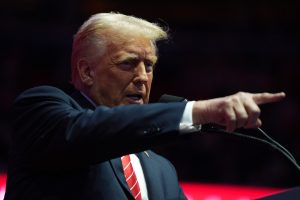
Massachusetts lawyer busted for trying to bribe Medford police chief for pot shop wins part of appeal
A local lawyer who was busted for trying to bribe the Medford police chief to get city approval for a pot shop, and who was sentenced to prison, has partially won his appeal to toss the convictions.
Somerville man Sean O’Donovan last year was sentenced to two years in prison — and he was ordered to pay a $150,000 fine — after he was convicted by a federal jury on two counts of honest services wire fraud, and one count of bribery concerning programs receiving federal funds.
O’Donovan ended up challenging the convictions, bringing his case to the U.S. Court of Appeals for the First Circuit, which tossed the convictions for the two counts of honest services wire fraud.
“We vacate the honest-services fraud convictions because the district court erroneously admitted the only evidence establishing each count’s jurisdictional element,” the U.S. Court of Appeals wrote in the ruling handed down last week.
“We affirm, however, the federal programs bribery conviction,” the court added.
With the appeals court vacating the convictions for the two counts of honest services wire fraud, the case will return to district court.
“The Court of Appeals affirmed the conviction of Mr. O’Donovan, finding that the government’s evidence proved that Mr. O’Donovan — a trained lawyer — tried to bribe the Medford Police Chief,” U.S. Attorney Joshua Levy said in a statement.
“Mr. O’Donovan stands convicted of bribery, and is being held accountable for his egregious misconduct,” Levy added.
When O’Donovan was sentenced last year, Levy called it “an old-school bribery scheme.”
O’Donovan was accused of trying to influence the Medford police chief in connection with the lawyer’s client’s recreational marijuana business, Theory Wellness.
The chief was serving on a committee to rank pot shop applications on behalf of the mayor, who would ultimately select three applicants to open retail marijuana stores in Medford.
The feds said O’Donovan approached the chief’s brother and offered to pay tens of thousands of dollars in tax-free cash to the brother in exchange for the chief’s support for the pot shop.
For instance, O’Donovan met the chief’s brother in a local church parking lot.
“At that meeting, the defendant told (the chief’s brother) that he was involved with a company looking to open a marijuana dispensary in Medford and offered (the brother) $25,000 to ask the Chief to give the company’s forthcoming application for a host community agreement ‘a second look,’” the ruling reads.
“The defendant explained that, if Theory Wellness obtained a host community agreement, he could guarantee (the brother) at least $25,000, and probably $50,000, payable pursuant to a sham consulting agreement or as cash under the table,” the ruling later states.
O’Donovan was slated to receive at least $100,000 each year from Theory Wellness’ marijuana business if its Medford application was successful.
After the brother informed the chief about O’Donovan’s corrupt offer, the chief alerted federal authorities. Both the chief and his brother cooperated with the investigation.
O’Donovan never informed Theory Wellness of the bribery scheme. O’Donovan at one point sent a text to Theory Wellness’ CEO, writing that he was “working this thing hard just so you know my friend.”
O’Donovan’s appeal focused on that text message, arguing that the FBI examiner’s testimony about that text should have been excluded.
The FBI examiner during the trial had testified that he knew from FBI training classes and his general experience with mobile devices that the iMessages from O’Donovan to the CEO were sent over the Internet.
But he admitted on cross that his knowledge was based solely on what an FBI instructor had told him and, even when pressed, he could not provide any more detail about how iMessages are transmitted.
“The parties dispute the correct characterization of the FBI examiner’s testimony,” the ruling reads. “The defendant asserts it amounted to impermissible expert testimony or, in the alternative, a lay opinion, while the government maintains that it was simple fact testimony.
“We need not resolve the matter because, however characterized, the testimony was inadmissible,” the court ruled. “The FBI examiner could not have properly given expert testimony because he was not disclosed or qualified as an expert.”
As a result, the testimony should have been excluded, the court ruled.
“And the erroneous admission of the testimony was not harmless,” the court added. “Rather, it plainly contributed to the verdict — as the examiner’s testimony was the only proof presented to satisfy (the) interstate-commerce element.”
This led to the appeals court vacating the convictions on counts one and two, and bringing the case back to district court for further proceedings.
O’Donovan also challenged his conviction for federal programs bribery. The court rejected that appeal.
The court wrote, “The evidence that the defendant requested that the Chief perform official acts was overwhelming and uncontested.”

